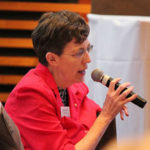-
You are here: Home > Future directions > Research study 2011: A wider canvas for IAR


Research study 2011: A wider canvas for IAR
Background
In August, 2011 The Crawford Fund announced its new research study on emerging trends in world food security. The purpose of the study is to analyse the emerging trends that will affect the future international agricultural research agenda and identify potential new funding streams for such research. The study will also demonstrate the benefits of investments in international agricultural research.

The study was led by Dr Gabrielle Persley of the Doyle Foundation. Gabrielle was a foundation staff member of ACIAR and co-author of the 2008 Crawford Fund Task Force Report on World Food Security.
The study presented its findings progressively through a series of Policy Briefs which can be ordered or downloaded from the website (see below).
Study context
The study took place in the context of renewed concerns about world food security and a recurrence of factors that led to the food price spike that shocked the world in the first half of 2008. These factors include the competition amongst grain crops for use as food, feed or bio-fuels; the rising price of oil, which in turn increases the costs of agricultural inputs, particularly fertilisers and pesticides; and the lack of affordable credit.
“There is a maelstrom of factors that continue to have negative impacts on small farmers in their efforts to increase productivity and generate surpluses for sale in local, regional and international markets,” said Dr Persley.
“Since the food crisis in 2008, the world news media has concentrated less on further record highs in food prices, with attention on the series of natural disasters in various parts of the globe and on political unrest, yet there is little focus on the fact that they are interrelated.”
Study purpose
The study briefs and related media and communications outputs on each topic were intended to inform and influence politicians, policy makers and others with interests and responsibilities in food security, agriculture and international development.
Study outcomes
The study outcomes were:
- Within each priority topic, to identify current gaps and areas for future investments by public and private entities in international agricultural research.
- To communicate the benefits of international agricultural research more effectively and to a wider audience in Australia and internationally.
- Specifically for the Crawford Fund, to inform more strategic choices of topics for future Crawford Fund Parliamentary Conferences and future Master Classes; and identify specific areas for support through Crawford Fund State and Territory committees and their training programs.
The priority topics addressed as part of our research project are listed below.
Policy briefs
1. Overview of “A wider Canvas for international agricultural research”
2. Biodiversity, agriculture and food security Conserving and utilising plant and animal genetic resources; (Crawford Fund Parliamentary Conference 2010)
3. Biosecurity, agriculture and plant health and their importance in ensuring global food security; this issue emerged from the 2010 Crawford Fund Parliamentary Conference and is linked with Plantwise, an initiative being developed by CABI on global plant health.
4. New approaches to international research funding: including advanced market commitments, utilised in the human health sector to encourage the development of new vaccines and drugs for the treatment of orphan diseases.
5. Climate change, agriculture and food security Mitigation and adaptation to climate change to achieve environmental and food security objectives; ways of drawing on the broader pool of resources that may emerge from international climate change agreements; (Crawford Fund Parliamentary Conference 2009)
6. Private sector R&D and food security: The current and future contribution of private sector R&D towards ensuring food security; (Crawford Fund Parliamentary Conference 2008)
7. The supermarket revolution, agriculture and food security, its impact on farmers, consumers and retailers; and the scope for investment by multinational supermarkets in international R&D; (Crawford Fund Conference 2011)
8. Communication of international agricultural research outcomes through public extension services, community-based organisations and private agencies; the increasing importance of mobile phones and social media as means of communications amongst farmers and communities in the developing world; and the role of public awareness campaigns in increasing international engagement in agricultural research and increased funding for national and international agricultural research systems from governments, the philanthropic sector and the private sector – a key mission interest for the Crawford Fund.
9. New trends in science, including the applications of genetically modified organisms to increase productivity and sustainability of agriculture in the developing world over the next decades.
10. Synthesis of findings and recommendations from Briefs 1-9. Communication of key findings with policy makers; Identification of gaps requiring further research.
Related documents
- A Wider Canvas – Overview
- Food from thought – Bread from stones by Dr Gabrielle Persley AM
- 2015 Crawford Fund Wider Canvas series paper




 0
0